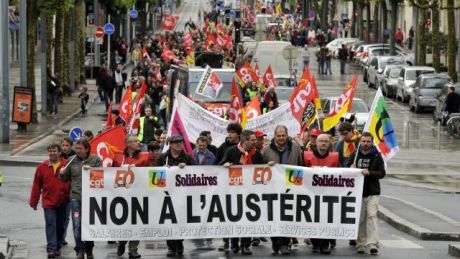News
You are here
France: the election and the resistance

May 9, 2017
On May 7, the second round of the voting for the French presidency ended with the election of Emmanuel Macron. The former investment banker and government minister was at great pains to recast himself as a political outsider. During the first round he tried to distance himself from the accumulated disaffection with the established centre-left and centre-right political projects; he ran as a “centrist.” Macron, who won 66-percent of the final vote, benefited from second round tactical voting against his opponent Marine Le Pen, who captured 34-percent.
Polarization
The first round of the election, on April 23, revealed a massive split in the country. Only a few percentage points separated the top four candidates. In fourth with nearly 20-percent of the vote, leftist candidate Jeon-Luc Mélenchon surprised many mainstream commentators by making the largest gains. He captured seven million votes, three million more than the last election in 2012.
Mélenchon campaigned for a new “re-founded” French republic and opposition to the European Union that “strangle[s] the voice of the people”. He called for: a shift to 100-percent renewable green energy; a fully ecologically sustainable and de-commodified economy; the mass redistribution of wealth; heavy taxes on the rich; a hike in the minimum wage; full healthcare funding; easing of restrictive immigration and cannabis laws; opposition to neo-liberal trade agreements; and for France to withdraw from NATO.
While the biggest gains were made by the radical left, it was Marine Le Pen, candidate for the fascist Front national (FN), who was ultimately successful in advancing to the second round for a showdown with Macron. She made strides in advancing her strategy for building a mass fascist party by effectively rallying together hardened far-right elements with anti-immigrant populists, nationalists, social-conservatives and sizeable disaffected layers of the population.
In the second round, millions cast a blank (or null vote) to express their frustration with the choices on offer, and a quarter abstained. But most voters held their nose and cast a ballot for Macron, hoping to prevent Le Pen from assuming the presidency.
Austerity and Islamophobia breed fascism
Outgoing President François Hollande, of the centre-left ‘Parti socialiste’ (PS), came to office in 2012 on promises to end austerity, raise taxes significantly on the rich and bring down unemployment rates with job creation schemes (particularly for the young). Instead, his presidency was distinguished by his decision to override parliament and force through changes to labour laws that made it easier for employers to cut pay and layoff workers, increase working hours and make it harder to arrange time off for maternity or marriage and even to retire.
The PS government took advantage of the state of emergency declared after the 2015 terrorist attacks. Undemocratic maneuvers where supplemented by police violence; strikers and protesters were attacked. Hollande’s popularity plummeted to 4 per cent. Unsurprisingly, he decided not to contest the 2017 election, but not before months-on-end where the PS government scapegoated refugees and cynically tried to boost its popularity by posing as defenders of secularism and ‘republican’ values; curtailing the ability of, mainly Muslim, religious minorities to practice their faith. His party’s Prime Minister, Manuel Valls, even cheered on local police in the south of France who forced female Muslim bathers to strip at beaches on the Mediterranean coast.
The casual and deliberate use of racism and islamophobia by the government helped to further legitimize the discourse and narrative of fascist and far-right politicians.
Le Pen took full advantage and was able to supplement this by framing the FN as the alternative to the established parties who had contributed to the decline of French living standards and growth in economic insecurity and joblessness. While much of the anger and despair at the betrayals of the PS in power found an expression in the Mélenchon campaign, Le Pen managed to tap into enough to propel her to an early lead in the polls and eventually the second round.
La lutte continue
The challenge now for Macron, who doesn’t actually yet have a political party for the forthcoming June legislative election, will be to somehow cobble together enough support to establish a government he can work with. His plan to continue down the path of austerity is already facing renewed headwinds. A sense of abandonment may be turning from despair to action as demonstrations have already started.
The French left, including those who supported candidates other than Mélenchon, will face many challenges over the coming period. They will have to relate to the millions who voted didn’t vote for more of the same. It will be absolutely critical to build broad and effective unity against austerity, racism and the rising threat of fascism. There will be a need to intervene now in the run up to the parliamentary elections as well as mobilize in the streets, communities and workplaces.
In order to do these things, they will be the need to put forward an engaging and transformative politics. It will be necessary to only articulate a clear vision of society transformed, but to find concrete ways to building a mass revolutionary movement of workers and oppressed layers who can uproot the economic and social system that is increasingly producing seeds that sprout forth ecological disaster, endless austerity and fascist reaction.
Section:










